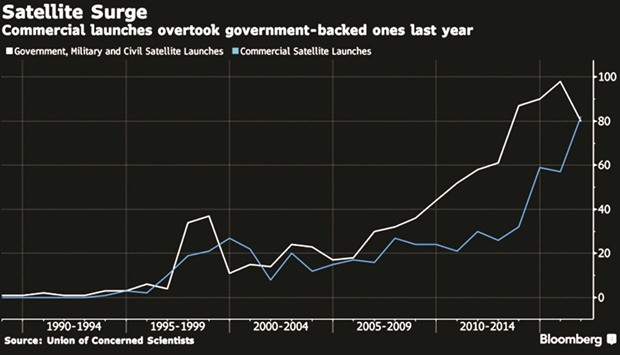The Middle East has a huge impact on energy here on Earth. One analyst thinks some regional powerhouses may leverage that role into the development of natural resources in space.
Countries like the UAE and Saudi Arabia are developing space programmes and investing in nascent private space commodity initiatives, said Tom James, a partner at energy consultant Navitas Resources. Doing so could give them a foothold in building extraterrestrial reserves of water - a substance likely to fuel travel within space - and other resources that could be used for in-space manufacturing.
“Water is the new oil of space,” James said in Singapore. “Middle East investment in space is growing as it works to shift from an oil-based to a knowledge-based economy.”
Prospecting satellites can be built for tens of millions of US dollars each and an asteroid-harvesting spacecraft could cost $2.6bn, in line with mining operations on Earth, Goldman Sachs Group Inc analysts including Noah Poponak said in an April 4 research note. Most resources would be processed and used in space although it may be economic to ship some commodities, such as platinum, back to Earth, according to James and Goldman.
“Space mining is still a long way from commercial viability, but it has the potential to further ease access to space,” Poponak wrote. “Water and platinum group metals that are abundant on asteroids are highly disruptive from a technological and economic standpoint.”
Navitas expects companies to launch satellites searching for rare gases and metals in asteroids within five years, with actual mining happening within eight. A single asteroid might contain 175 times more platinum than the Earth mines in a year, Goldman said, citing a project associated with the Massachusetts Institute of Technology. That much platinum could be worth $25bn to $50bn, although it would likely crater the market for the metal.
“You could go massively short on platinum and then show up at settlement with an asteroid, but you probably could only do that once,” James said in an interview after a presentation at the National University of Singapore’s Middle East Institute. “I don’t think the counter-party would take that trade a second time.”
Platinum futures for July delivery fell 0.6% to $972.10 an ounce on the New York Mercantile Exchange yesterday.
In the long term, most of the commodities mined in space will stay in space to power a low-orbit space economy built around satellites and space stations, James said. In that scenario, water accumulated in space would become valuable as it could be used for rocket fuel for interstellar voyages. The substance is too heavy and costly to transport from Earth.
Water can be used as a propellant in space or split into hydrogen and oxygen, and then recombined and combusted. Deep Space Industries Inc, an asteroid mining company, has developed a thruster that heats water into a steam propellant, according to Goldman.
The UAE and Saudi Arabia already have space programmes, with Saudi Arabia signing a pact with Russia in 2015 for cooperation on space exploration, according to a report from Arab News. Abu Dhabi is an investor in Richard Branson’s space tourism venture, Virgin Galactic. In addition to money, the Middle East also has geography on its side.
The closer a country is to the equator, the more surface velocity there is from spinning around the Earth’s axis, meaning space ships need to burn less fuel to exit the atmosphere. That benefits some Middle Eastern countries as launch sites, James said.
“The Middle East builds the tallest buildings, the biggest shopping complexes,” said James. “Certainly they’re having a big impact on the space and satellite industries as well.”

SPACE
